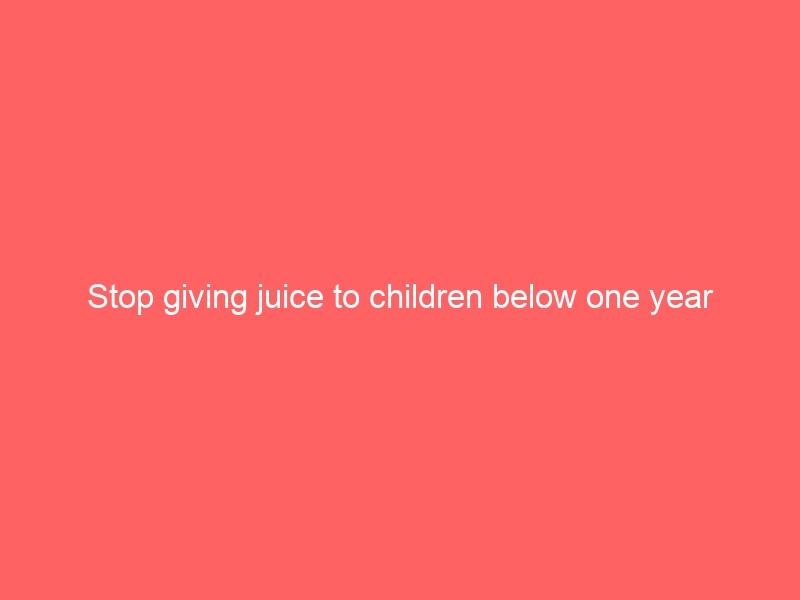Fruit juice is not fruit. Experts warn that juice for babies in their first year of life offers no nutritional benefit and should not be included in their diet.
Parents, the next time your baby is offered fruit juice, it would be important to remember that this artificial juice, irrespective of its manufacturer’s health claims, is not good for babies less than one year.
Now, paediatricians are advising parents to stop giving fruit juice to children in the first year of life, saying the drink is not as healthful as many parents think.
In fact, they are also recommending that these reconstituted fruit juices be banned entirely from a baby’s diet during the first year because it has no essential role in healthy, balanced diets of children.
More so, they said fruit juice is not appropriate in the treatment of dehydration or management of diarrhoea.
Guidelines for kids
The guidelines by the American Academy of Paediatrics, in a new report, published online in the journal Paediatrics, indicate that older children should drink it only sparingly and all children should focus, instead, on eating whole fruit.
Fruit juice were restricted to 12.5 centilitres (four ounces) daily for one to three-year-olds, 17.7centilitres (six ounces) a day for four to six-year-olds and 23.65 centilitres (8 ounces) for children from seven to 18.
The update may come as a surprise to parents who had thought fruit juice was good for babies and even as healthy for them as whole fruit.
Mothers are always advised to give only breast milk to babies younger than six months, and without juice or water except for medications which had been prescribed by a competent physician.
Even in the second half of infancy, when other complementary foods or family diets are supposed to be added to meet the infant’s energy requirement, a store-brought fruit juice may not be appropriate.
“When you feed the baby with such unprofitable liquid diet, this can take the place of what babies really need. It ends up denying them the benefits of breast milk and other nutritious complementary foods that they need for their growth,” said Olugbemi Mokuolu, a Professor of Paediatrics, College of Health Sciences, University of Ilorin, Ilorin.
Professor Mokuolu added, “many of the fruit juices are highly concentrated in sugar and are not made from natural fruits. They are not made baby-friendly.
“They are just bombarding them with refined sugars, which bring up a lot of other challenges like tooth decay. In reality, they are not the focus of babies’ nutrition in their first year of life.”
Store-fruit juices in older children
Even for older children, Professor Mokuolu said that homemade fruit juices were the best. “We should go as natural as possible; it is a general rule for nutrition, too. The more natural they are, the safer they will be.”
Although store-fruit juice can be a healthy part of an otherwise well-balanced diet, he warned that even in older children, this juice which is often sweetened and refined, should not be a substitute for whole fruits and fresh fruit juice in their diet.
Not good for baby’s system
Fresh fruit juice should not be given to infants because there body system is still very fragile. “Those store-fruit juices are processed and contain some preservatives that a child, particularly infants, may not be able to tolerate. So it is safer and better to give fresh fruit juices,” said Professor Ngozi Nnam, President, Nutrition Society of Nigeria (NSN).
According to her, “we advocate freshly squeezed fruit juice to supply vitamin C and other nutrients from the fruit. They take very little quantity, so what they take should contain the full benefit of nutrients.
“Processing would have destroyed most of the vitamins and nutrients in store-fruit juices. Vitamin C in fruits, for instance, is destroyed easily by light and heat. So the nutrient that the parent assumes they are giving to the baby is no longer in the juice.”
Whole fruit better for older children
She said, however, older children since their digestive system is better developed could be served whole fruits. Whole fruit typically has more fibre than fruit juice and is less likely to cause dental decay.
Whole fruit also makes one feel fuller than juice, which can prevent overeating.
Moreover, experts now discourage children having sweetened drinks. It predisposes them to childhood obesity, which invariably increases their likelihood of developing other diseases like hypertension and diabetes later in life.
“Many schools encourage their pupils to come to school with just water and healthy snacks because this is what is healthy for them,” she added.
Another concern is that store-fruit juice can be a gateway drink of sorts. Studies show infants who drink more juice in the early period of life are more likely to go on to drink soda and sugar-containing beverages.
What is more, paediatricians are asked that children and teenagers limit intake of sports and energy drinks, or any other drink with caffeine, and to use sports drinks only when they really need them — like when they’re playing sports.
But a person needs to have exercised intensely for an hour before they need that boost.
The paediatricians say energy drinks often get confused with sports drinks, which generally don’t have caffeine. Caffeine not only interferes with sleep, it can cause anxiety, raise heartbeats, and increase the risk of dehydration.
Sports drinks don’t have that problem, but they do have sugar as the primary ingredient. All that sugar can contribute to obesity and tooth decay. Source: Tribuneonline












